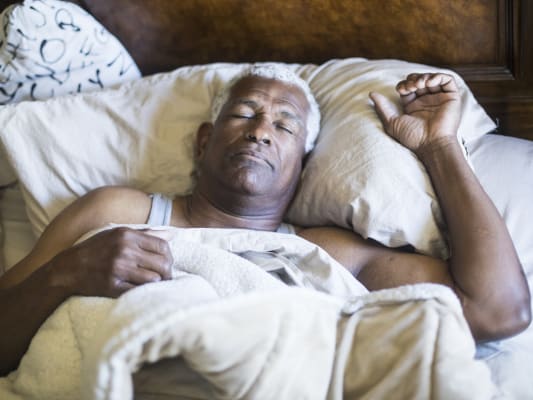Diagnosing and Treating Sleep Apnea

Sleep apnea is about more than the inconvenience of waking up in the middle of the night. It is an often underdiagnosed problem that is becoming more prevalent, and it can result in serious and negative side effects, including high blood pressure, heart failure and stroke.
Sleep apnea can also lead to inflammation and may lead to metabolic problems that result in obesity, diabetes, progressive weight gain or difficulty losing weight. New data makes a correlation between sleep apnea and early Alzheimer’s-type dementia.
While sleep apnea is a serious diagnosis, Dr. Margaret Woznica, medical director of Middlesex Health’s Sleep Disorders Center, says it is treatable, and she notes that there are now more choices when it comes to sleep apnea therapies.
Symptoms of sleep apnea include, but are not limited to, getting up frequently to use the bathroom; waking up feeling tired and not well rested; excessive daytime sleepiness; waking up with headaches; and problems with memory or concentration. Sleep apnea can be observed by bed partners as abnormal breathing, or not breathing during sleep, and it can be associated with snoring, body jumping and awakenings.
If you note any of these symptoms, you should see your doctor.
The presence of sleep apnea needs to be confirmed with testing done while you sleep. Depending on your doctor’s recommendation, testing can be done at home or in a sleep laboratory, such as the one at Middlesex Health.
If you are diagnosed with sleep apnea, treatments have advanced from just a few years ago, and the increase in options allows for more individualized treatment.

Positive airway pressure therapy, or CPAP, is the most established, predictable and successful therapy for sleep apnea, and CPAP machines have gotten quieter and smarter over the years. There are multiple CPAP mask types to accommodate for a variety of preferences, and they are made of much more comfortable materials than in the past.
Dr. Woznica says other treatments can also be considered depending on the severity of your sleep apnea, your intolerance for CPAP and your preference.
Other therapies can include dental devices with jaw advancement; nasal valves; positional therapy; targeted oral and nasal surgeries; and weight loss surgeries. It can even include stimulation of a nerve that leads to tongue protrusion at night. These options have also improved over time. There are more durable oral devices and minimal impact surgical procedures.
Ultimately, Dr. Woznica says controlling sleep problems may be a preventative measure, much like eating healthy and exercising. Taking steps to control your sleep problems will help over time, she says. During the COVID-19 pandemic, Middlesex Health, including its Sleep Disorders Center, is taking extra steps to keep both patients and staff safe.
To learn more about sleep apnea and Middlesex Health’s Sleep Disorders Center, visit MiddlesexHealth.org/sleep. You can also watch Dr. Woznica's interview on WTNH.
Featured Provider

More Stories
Healing One Tune at a Time
Middlesex Health Cancer Center offers free virtual music therapy sessions to individuals with cancer. Music therapy is the use of music or elements of music to help manage a range of conditions and improve your quality of life.
Spotlight: Men’s Health
When it comes to health care concerns that disproportionately impact men, such as heart disease and cancer, there is good news despite the grim statistics. With the help of a health care provider, many diseases are preventable.